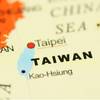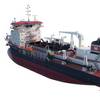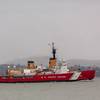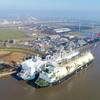Mozambique: $30b Invested for 2018 LNG Export
More than $30 billion will be invested initially in Mozambique's natural gas sector to build capacity to produce 20 million tonnes per year of liquefied natural gas (LNG), with the first exports due to start in 2018, the national oil company said.
The investments will be made to develop the northern ports of Pemba and Palma, where a giant logistics base and LNG production plants are planned that will use gas produced from offshore fields in the Rovuma Basin being developed by U.S. oil major Anadarko Petroleum Corp and Italy's Eni.
Mozambique, which still bears the scars of a 1975-1992 civil war, is hoping revenues from its large gas deposits and its fledgling coal mining industry will help it emerge from years of poverty and dependence on foreign donors.
The country holds presidential elections on Oct. 15.
"In an initial phase, liquefaction units with a total capacity for 20 million tonnes a year of LNG will be built and operated. The investment to be made tops $30 billion," Nelson Ocuane, president of the state oil company ENH, told Reuters.
The initial exports from 2018 will come from a first LNG train of 5 million tonnes a year, with overall capacity for the industry to be ramped up subsequently to 20 million tonnes per year.
Ocuane, speaking on the sidelines of the launch of the project for the Pemba port logistics base on Wednesday, did not give a detailed breakdown of who would make the investments, between foreign partners, the government and state entities.
Anadarko and Eni's commitments already run into several billions of dollars, but Ocuane's estimate was the first to put an overall cost tag on the first phase of Mozambique's LNG ambitions.
Mozambique's parliament last week approved amended legislation for the gas and oil sector, including a "special regime" for LNG development in Rovuma Basin Areas 1 and 4 where Anadarko and Eni are operating. This covered the construction and operation of LNG facilities and related activities.
Government officials have said this regime, aimed at attracting investment, includes the possibility of certain "exemptions" in contracts, but these have not been specified.
"Mozambique has good conditions to start exporting in 2018 because all the investment plans indicate that the essential infrastructure will be in place by then," Ocuane said.
Officials say fresh bidding rounds for Mozambican gas and oil concessions would be held in the coming months.
The International Monetary Fund, which sees Mozambique's economy growing 8 percent annually in the medium term - one of the highest rates in Africa - has said the country can expect "substantial revenues" from LNG by 2022.
But it says Mozambique faces risks from climate disasters, commodity price shocks and variations in global demand for its coal and gas, as well as "financing risks for megaprojects".
Some industry analysts say Mozambique may struggle to meet its target date of 2018 for the start of LNG exports. They say it must develop its LNG potential by the end of this decade as other supplies come on the market from West and East Africa and the global supply/demand scenario shifts, with the United States moving from energy importer to exporter.
Of the world's LNG, about 70 percent is consumed by China, South Korea, India, Japan and Taiwan, and Ocuane said it was these Asian customers Mozambique would aim to supply.
Around 180 trillion cubic feet of gas has been found in Mozambique's offshore Rovuma Basin. This would be enough to supply Germany, Britain, France and Italy for 18 years.
Mozambique "Prefers" Onshore LNG Plants
Italy's Eni has proposed constructing two floating offshore LNG plants to process gas from its Rovuma Basin area, which would be quicker to complete than an onshore facility.
Ocuane said Mozambique's government was giving technical consideration to the Eni proposal, and would give its answer "in due course".
But he added: "The government prefers the construction of LNG units onshore because this has the potential of creating employment and allowing the possibility of a series of investments in support areas for the gas industry."
Under the new legislation for the sector, foreign operators who win licences to explore for oil and gas must do so in partnership with state oil company ENH. The law also says that 25 percent of all gas and oil produced should go to the domestic market.
Anne Fruhauf, Senior Vice-President for Africa for New York-based Teneo Intelligence, said the legislation "reflects key political priorities, namely industrial development, local procurement and a stronger role for national oil company ENH."
"For investors the planned domestic market obligation (DMO) - targeting 25 percent of petroleum companies' production - will be one of the most controversial aspects of the legislation," she said in emailed comments. She expected further details of the operating framework to be defined in secondary regulations.
Mozambique recently set up a public company, Portos de Cabo Delgado, bringing together the state rail operator, CFM, and the national oil company to develop the northern LNG infrastructure.
The sub-concession for the Pemba port development has been given to ENHILS (ENH Integrated Logistics Services), a joint venture between ENH subsidiary ENH Logistics, which holds 51 percent, and Orlean Invest, a Nigerian company, with 49 percent.
(By Manuel Mucari; Additional reporting by Peroshni Govender in Johannesburg; Writing by Pascal Fletcher; editing by Keiron Henderson)










